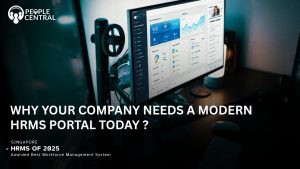Singapore’s dynamic business environment thrives on a strong talent pool. But attracting and retaining top employees requires a strategic approach to Human Resource (HR) Management. This blog outlines the key aspects of HR in Singapore that businesses of all sizes need to understand.
HR Management: The Essentials
1. Legislative Landscape
Singapore boasts a well-defined legal framework for employment. The cornerstone is the Employment Act (EA), which outlines minimum standards for working conditions, leave entitlements, and termination procedures. Understanding the EA is crucial to ensure your business is compliant.
Beyond the EA, several other regulations impact HR practices in Singapore. These include:
- Central Provident Fund (CPF): A mandatory social security contribution scheme for employers and employees.
- Foreign Manpower Act: Regulates the employment of foreign workers in Singapore.
- Personal Data Protection Act (PDPA): Governs the collection, use, and disclosure of personal data.
2. Building Your Team
Recruitment is a core HR function. Singapore offers a diverse talent pool, but competition for skilled workers can be fierce. Here’s how to optimize your recruitment process:
- Craft compelling job descriptions: Clearly outline the role’s requirements and responsibilities.
- Utilize diverse recruitment channels: Leverage online platforms, professional networks, and referrals to reach a wider audience.
- Comply with Fair Consideration Framework (FCF): Ensure fair and non-discriminatory hiring practices.
- Offer competitive compensation and benefits: Singaporean workers value competitive salaries, healthcare benefits, and work-life balance initiatives.
3. Onboarding and Development
A smooth onboarding process helps new hires integrate seamlessly. This includes providing clear job expectations, company policies, and opportunities for mentorship. Investing in employee development is crucial for fostering a skilled and engaged workforce. Consider offering training programs, leadership development initiatives, and opportunities for professional growth.
4. Employee Relations and Retention:
Maintaining positive employee relations is vital for a healthy work environment. Here are some key aspects:
- Open communication: Foster a culture of open communication where employees feel comfortable raising concerns.
- Performance management: Implement a clear performance management system with regular feedback and performance reviews.
- Employee engagement: Create initiatives that promote employee well-being, work-life balance, and recognition programs.
5. Tech-driven HR:
HR technology (HR Tech) is rapidly transforming the way HR departments operate. Consider implementing HR software for tasks like payroll management, performance management, and employee self-service.
HR Management: The Singaporean Context
Singapore’s unique demographics present both opportunities and challenges: Singapore’s unique demographics present both opportunities and challenges:
- Aging population: Employees are becoming scarce hence the need to attract the youthful population into the workforce.
- Globalized workforce: There are numerous organizations, which depend on foreign staff. So, knowledge of regulations and the management of a multicultural and diverse staff are crucial.
Automate your HR Management with PeopleCentral
Want to elevate and simplify your Human Resource experience? PeopleCentral’s cutting-edge, cloud based HRMS solutions streamlines processes, empowers employees and helps businesses thrive.
What features does People Central Incorporate:
- Employee Management: From seamless onboarding to in-depth performance analysis, it’s your gateway to a dynamic and effective HRMS software Singapore.
- Leave Management: Streamline leave requests & approvals, track balances, and ensure compliance with HRMS leave management.
- Claim: Streamline expense reimbursements and employee claims with our HRM
- Appraisal: Set goals, track progress, and deliver clear feedback, all in one place.
- Payroll: Streamline payroll with automatic calculations, deductions & taxes, all integrated within your HRMS for effortless employee payments.
- Timesheet: Track employee hours for accurate payments and project costing.
Conclusion:
HR Management plays an important role in the Singapore company due to its significance in the management of any business organization. To sum up, it is vital for the companies to know the national and local employment laws and act according to the set norms and best practices in the relations with the employees. As a result, the businesses can gain strategic advantage over the competition in the struggle to attract the best performers in the labor market.
Additionally, consider these resources for further information:
Through the application of these strategies and keeping abreast with competition trends, this type of an HR management system assists in enhancing business success in Singapore’s talent market.








 5
5


























